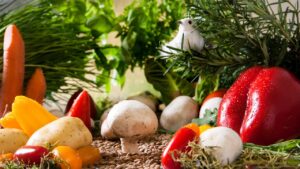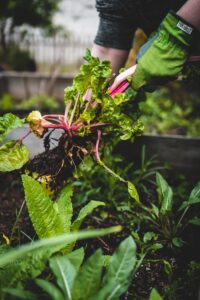So you want a thriving vegetable garden, huh? Well, you’ve come to the right place! This article will guide you through choosing the perfect mulch for your vegetable garden. Mulching helps retain moisture, prevents weed growth, and provides essential plant nutrients. With our expert tips and advice, you can select the ideal mulch that caters to your garden’s needs, ensuring a bountiful harvest in no time.
Importance of Mulch in a Vegetable Garden
Mulch is crucial in maintaining the health and productivity of a vegetable garden. It provides numerous benefits that contribute to the overall success of vegetable growing. Here, we will discuss why mulch is essential in a vegetable garden.
Conserves soil moisture
One of mulch’s primary benefits is its ability to conserve soil moisture. By acting as a barrier between the soil and the air, mulch helps to reduce evaporation and retain moisture in the soil. This is particularly important in dry regions where water scarcity is a concern. By conserving soil moisture, mulch helps ensure that vegetables have a constant water supply, leading to healthier and more productive plants.
Controls weed growth
Weeds can be a significant nuisance in a vegetable garden, competing with the crops for water, nutrients, and sunlight. Mulch acts as a natural weed suppressor by blocking sunlight from reaching the soil surface. This inhibits weed germination and growth, reducing the need for manual weeding or herbicides. By preventing weeds from taking over the garden, mulch allows vegetables to thrive without the interference of unwanted plants.
Regulates soil temperature
Vegetables have specific temperature preferences for optimal growth. Mulch helps to regulate the soil temperature by insulating it from extreme heat or cold. During hot summer, mulch keeps the soil cool by reducing temperature fluctuations and minimizing evaporation. In colder climates, mulch acts as an insulating layer, protecting the soil and roots from freezing temperatures. By maintaining a more stable soil temperature, mulch provides a conducive environment for vegetable growth.
Improves soil fertility
Mulch positively impacts soil fertility by gradually breaking down and enriching the soil with organic matter. Organic mulches, such as straw, wood chips, and leaves, decompose over time, releasing nutrients into the soil. This nutrient replenishment enhances the fertility of the soil, providing a healthy and nutrient-rich environment for vegetables to grow. Improved soil fertility translates to increased yields and healthier plants.
Prevents soil erosion
Soil erosion can be a significant issue, especially in sloped vegetable gardens or areas with heavy rainfall. Mulch acts as a protective layer, preventing soil erosion by reducing the impact of raindrops and allowing water to infiltrate the soil slowly. It also helps to anchor the soil in place, preventing it from being washed away during heavy storms. By minimizing soil erosion, mulch helps maintain the integrity of the garden beds and promotes a stable growing environment for vegetables.
Types of Mulch
Different types of mulch are available for vegetable gardens, each with unique characteristics and benefits. Understanding the various types of mulch can help you choose the right one for your specific needs and preferences. Let’s explore the three main types of mulch commonly used in vegetable gardens.
Organic mulch
Organic mulch is made from natural materials that decompose over time, enriching the soil with organic matter. Some common examples of organic mulch include straw, wood chips, leaves, grass clippings, compost, and hay or straw bales. Organic mulch provides numerous benefits, including weed suppression, moisture retention, and improved soil fertility. It also adds aesthetic appeal to the garden beds and promotes a more natural vegetable-growing environment.
Inorganic mulch
Inorganic mulch is typically made from synthetic materials that do not decompose. Plastic mulch, rubber mulch, and landscape fabric are famous examples of inorganic mulch. Inorganic mulch offers advantages, including excellent weed control, moisture conservation, and heat retention. It is beneficial in areas with high weed pressure or where a long-lasting mulch is desired. However, inorganic mulches do not contribute to soil fertility as organic ones.
Living mulch
Living mulch involves growing low-growing plants as a ground cover between vegetable rows. Some common examples of living mulch include clover, thyme, and white Dutch clover. Living mulch offers the benefits of both organic and inorganic mulch, such as weed suppression, moisture retention, and soil temperature regulation. Additionally, it can attract beneficial insects and improve overall garden biodiversity. However, living mulch requires careful management to prevent competition with vegetable crops.
Considerations for Choosing the Right Mulch
Several factors should be considered when selecting the appropriate mulch for your vegetable garden. These factors include climate and weather conditions, vegetable type and growth habits, soil type and pH level, and availability and cost. Considering these factors, you can make an informed decision and choose the mulch that best suits your garden’s needs.
Climate and weather conditions
The local climate and weather conditions greatly influence the choice of mulch. Mulches that retain moisture, such as straw or wood chips, are preferred in hot and dry regions. Mulches that promote water drainage, like gravel or landscape fabric, may be more suitable in areas with heavy rainfall. Understanding your region’s specific climate and weather patterns will help determine the mulch that can effectively meet your garden’s requirements.
Vegetable type and growth habit
Different vegetable plants have varying growth habits and preferences. Some vegetables, like tomatoes or peppers, benefit from the heat-retentive properties of plastic mulch or black landscape fabric. Others, such as leafy greens or root crops, thrive with organic mulches, promoting soil moisture retention and suppression of weeds. Consider the specific requirements of the vegetables you intend to grow and choose a mulch that aligns with their preferences.
Soil type and pH level
The soil type and pH level play a crucial role in a vegetable garden’s overall health and productivity. Some mulches, like wood chips or leaves, can influence the soil pH due to their natural decomposition process. It is essential to assess your soil’s characteristics and choose a mulch that complements its composition. If you have acidic soil, for instance, a mulch that adds alkalinity, such as straw, may be beneficial in achieving a balanced pH level.
Availability and cost
Availability and cost are practical considerations when choosing mulch for your vegetable garden. Some mulches may be available in your area, while others require special ordering or sourcing. Consider the cost of purchasing or acquiring the mulch and any additional costs involved in its application. Organic mulches, such as leaves or grass clippings, are often readily available and cost-effective, while inorganic mulches, like rubber or plastic, may require a more significant investment upfront.
Organic Mulch Options
Organic mulch provides numerous benefits to a vegetable garden and is popular among gardeners. Several organic mulch options are available, each with unique characteristics and advantages. Let’s explore some of the commonly used organic mulches for vegetable gardens.
Straw
Straw is a commonly used organic mulch that is readily available and inexpensive. It provides excellent weed suppression, moisture retention, and temperature regulation. Straw is particularly beneficial for heat-loving plants, as it helps to maintain a more stable soil temperature during hot summer months.
Wood chips
Wood chips are an organic mulch that decomposes slowly, providing long-lasting benefits to the soil. They help suppress weeds, conserve moisture, and gradually release nutrients as they break down. Wood chips are ideal for perennial vegetable plants or areas where you don’t want to disturb the soil frequently.
Leaves
Leaves are a readily available and cost-effective organic mulch option. They provide weed suppression and moisture retention, and as they decompose, they improve soil fertility. Leaves are beneficial for insulating the soil during winter and can be easily collected from your yard or local parks.
Grass clippings
Grass clippings from mowing your lawn can be used as organic mulch. They are readily available and provide excellent moisture retention and weed suppression. However, to avoid any negative impacts on your vegetable garden, it is important to use grass clippings that have not been treated with herbicides or pesticides.
Compost
Compost is a rich, nutrient-dense organic mulch that provides numerous benefits to a vegetable garden. It improves soil fertility, retains moisture, and suppresses weeds. Incorporating compost into the soil or using it as a top dressing around plants can significantly enhance your vegetable garden’s overall health and productivity.
Hay or straw bales
Hay or straw bales can be used as mulch and a growing medium for vegetable plants. They provide insulation, retain moisture, and suppress weeds. Hay bales help create raised beds or improve soil structure in challenging garden conditions.
Inorganic Mulch Options
Although not as popular as organic mulches, inorganic mulches have advantages. They are often used in specific garden situations where long-term durability and weed control are priorities. Let’s explore some commonly used inorganic mulch options for vegetable gardens.
Plastic mulch
Plastic mulch is a synthetic mulch typically made of black, silver, or red polyethylene. It is a popular choice among commercial vegetable growers as it provides excellent weed control, moisture retention, and heat absorption. Plastic mulch also helps increase soil temperature, promoting early plant growth and extending the growing season. However, it does not contribute to soil fertility and can be challenging to manage in smaller home gardens.
Rubber mulch
Rubber mulch is made from recycled tires and offers a long-lasting and visually appealing option for mulching vegetable gardens. It is an excellent weed suppressor, conserves moisture, and provides a cushioned surface for walking. Rubber mulch does not decompose, but it can release small amounts of toxins and may not be suitable for organic gardening practices.
Landscape fabric
Landscape fabric, also known as weed barrier or geotextile, is a synthetic material that allows water and air to penetrate while suppressing weed growth. It is an effective option for controlling weeds in vegetable gardens and helps retain moisture in the soil. Landscape fabric is often combined with organic mulches, such as wood chips or gravel, to provide long-lasting weed control.
Living Mulch Options
Living mulch involves growing low-growing plants as a ground cover between vegetable rows. These plants provide the benefits of organic and inorganic mulches, such as weed suppression, moisture retention, and soil temperature regulation. Here are some standard options for living mulch in a vegetable garden.
Clover
Clover is a popular choice for living mulch due to its ability to fix nitrogen in the soil. It provides weed suppression and moisture retention and encourages beneficial insect activity. Clover is often used in vegetable gardens with nitrogen-demanding crops, such as corn or tomatoes.
Thyme
Thyme is a low-growing herb that can be a living mulch in a vegetable garden. It provides weed suppression, attracts beneficial insects, and adds a pleasant aroma to the garden. Thyme is a good choice for areas with full sun and well-drained soil.
White Dutch clover
White Dutch clover is another standard option for living mulch, especially in areas with moderate foot traffic. It suppresses weeds, fixes soil nitrogen, and creates a natural aesthetic appeal. White Dutch clover is often used in vegetable gardens with cool-season crops like lettuce or peas.
Pros and Cons of Organic Mulch
Organic mulch offers numerous benefits to a vegetable garden but has some drawbacks. Let’s explore the pros and cons of using organic mulch in your garden.
Advantages of organic mulch
- Improved soil fertility: Organic mulch gradually breaks down, enriching the soil with organic matter and essential nutrients.
- Weed suppression: Organic mulch is a natural weed suppressor, reducing resource competition between weeds and vegetable crops.
- Moisture retention: Organic mulch helps to conserve soil moisture by reducing evaporation, ensuring a constant water supply for vegetable plants.
- Temperature regulation: Organic mulch insulates the soil, preventing extreme temperature fluctuations and maintaining a more stable environment for plant roots.
- Aesthetic appeal: Organic mulch adds visual appeal to the garden beds, creating a natural and cohesive look.
Disadvantages of organic mulch
- Decomposition and replenishment: Organic mulch must be replenished periodically as it decomposes over time to maintain its effectiveness.
- Nutrient leaching: Some organic mulches may leach nutrients, particularly nitrogen, into the surrounding soil, potentially affecting nutrient balance.
- Potential for mold or pests: If not appropriately managed, organic mulch can create a favorable environment for mold growth and attract pests, such as slugs or snails.
- Wildlife attraction: Certain organic mulches, such as straw or hay, may attract wildlife, such as rodents or birds, which can cause damage to the garden.
Pros and Cons of Inorganic Mulch
Although less commonly used in vegetable gardens, inorganic mulch offers its own advantages and disadvantages. Let’s explore the pros and cons of using inorganic mulch in your garden.
Advantages of inorganic mulch
- Long-lasting: Inorganic mulches like plastic or rubber do not decompose and provide long-lasting weed control and moisture retention.
- Excellent weed suppression: Inorganic mulches create a barrier that prevents weed seeds from germinating and competing with vegetable crops.
- Moisture conservation: Inorganic mulches help to retain moisture in the soil, reducing the need for frequent irrigation and conserving water.
- Heat absorption: Inorganic mulches, particularly black plastic, absorb heat from the sun, promoting early plant growth and extending the growing season.
- Low maintenance: Inorganic mulches require minimal maintenance and do not need to be replenished as frequently as organic mulches.
Disadvantages of inorganic mulch
- Limited contribution to soil fertility: Inorganic mulches do not decompose and add organic matter to the soil, limiting their ability to improve soil fertility.
- Potential heat stress: In hot climates, inorganic mulches like black plastic can increase soil temperatures excessively, potentially causing heat stress to plants.
- Soil compaction: Inorganic mulches can contribute to soil compaction if not properly managed, leading to poor root development and restricted water infiltration.
- Environmental concerns: Some inorganic mulches, such as rubber, are made from recycled materials and may release small amounts of toxins or microplastics over time, raising environmental concerns.
Tips for Applying Mulch in a Vegetable Garden
Applying mulch correctly is essential to maximize its benefits and ensure the healthy growth of your vegetable garden. Here are some tips to consider when applying mulch in your garden:
Prepare the soil
Before applying mulch, prepare the soil by removing any existing weeds or plant debris. Loosen the soil surface with a garden fork or rake to improve water infiltration and aeration. Amend the soil with organic matter, such as compost, to enhance its fertility and structure.
Apply mulch at the right time.
Apply mulch when the soil has warmed up in the spring, and the risk of frost has passed. Mulch should be applied when the soil temperature is consistently above 50°F (10°C), as this helps promote seed germination and plant growth. Mulching early in the season can delay plant development and hinder seedling emergence.
Maintain proper mulch depth.
The depth of mulch applied is crucial for its effectiveness. Apply a layer of mulch between 2 to 4 inches (5 to 10 cm) thick, depending on the mulch used. Thicker mulch layers provide better insulation and weed suppression, but excessive mulch can also lead to waterlogging or restrict air circulation. Avoid piling mulch directly against the stems of plants to prevent moisture buildup and potential disease.
Avoid mulch touching plant stems.
Mulch should be placed at least a few inches away from the stems of vegetable plants to prevent moisture buildup and potential rot. Leaving a small space between the mulch and plant stems allows air circulation and reduces the risk of fungal or bacterial diseases. Mulch should form a circle around the plant, exposing the stem’s immediate base.
Regularly check for moisture and adjust irrigation.
Mulch helps retain soil moisture, but checking the moisture level and adjusting irrigation regularly is essential. Irrigate deeply when necessary, ensuring the water reaches the root zone beneath the mulch. Mulch can sometimes create a barrier that prevents rainwater or irrigation from reaching the soil adequately, so monitoring moisture levels is essential for plant health.
Replacing Mulch
Over time, mulch may need to be replaced to maintain its effectiveness and appearance. Here are some considerations for replacing mulch in your vegetable garden:
When to replace mulch
Mulch should be replaced when it has significantly decomposed, lost color, or become compacted. Organic mulches must be replenished every year or two, while inorganic mulches can last longer. Regularly monitor the condition of your mulch and replace it as necessary to ensure its benefits are continuously maximized.
How to replace mulch
Remove the old mulch from the garden bed using a rake or garden fork to replace the mulch. Clear away any weeds or plant debris that may have accumulated. Prepare the soil surface by loosening it with a garden fork or rake, and apply a new layer of fresh mulch. Ensure the new mulch layer is even and adequately covers the desired area.
Proper disposal of old mulch
Proper disposal of old mulch is essential to prevent the spreading of diseases, pests, or weed seeds. If the old mulch is organic, add it to your compost pile or use it as a top dressing in other garden areas. If the old mulch is heavily infested with pests or diseases, it is best to bag and dispose of it in your regular trash collection to prevent further spread.
In conclusion, mulch is vital to a vegetable garden’s success. From conserving soil moisture to controlling weed growth, regulating soil temperature, improving soil fertility, and preventing soil erosion, the importance of mulch cannot be overlooked. By choosing the right mulch for your garden, considering factors like climate, soil type, and vegetable preferences, and following proper mulch application and maintenance techniques, you can reap the full benefits of mulching and enjoy a thriving vegetable garden season after season.



